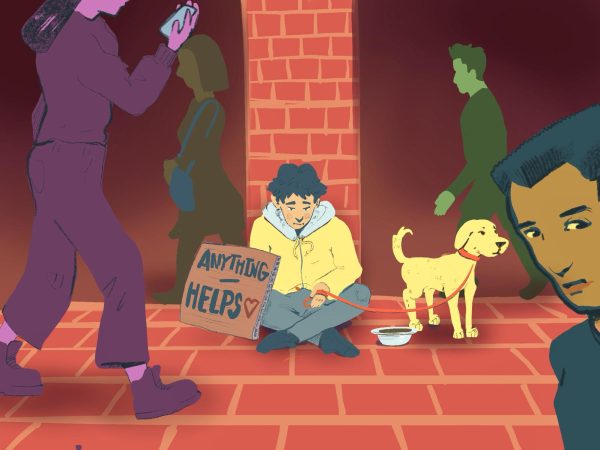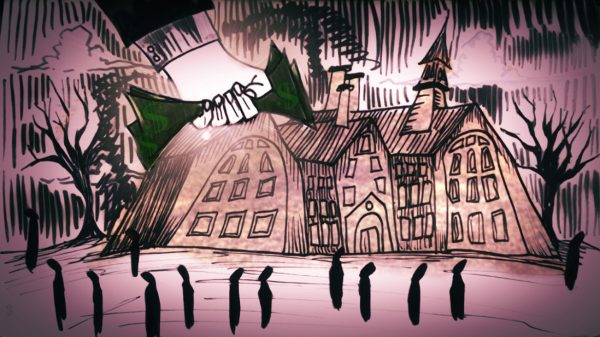The new School of Languages is more beneficial than you think
April 12, 2021
I was less surprised than I probably should have been when I heard about the huge budget cuts in the College of Arts and Sciences last semester.
I knew some departments were losing majors and minors, but many of the specific changes were lost amidst general student outrage. I’m a double language major and I just was thankful to see neither Chinese nor Japanese were on the chopping block—yet.
Then, I got an email from Patricia Prelock, provost and senior vice president, about an Academic Reorganization Working Group. ‘Oh no, not again,’ I found myself thinking as I searched frantically for what this vague “‘reorganization”’ would entail.
This group would “consider realignments that capitalize on [UVM’s] strengths, collective resources and academic and research synergies while ensuring a sustainable future for the university,” according to the Jan. 11 email.
Under the Office of the Provost page on the University of Vermont website, I found the drafted reorganization plan.
My heart dropped as my eyes read and re-read the words “School of Languages.”
“This is it,” I thought. “They’ve penned up all the languages under one department. Soon the slaughter will begin.” I couldn’t see any benefit from the proposed changes.
Newly invigorated to support the Asian language departments, I joined the Student Language Advisory Committee.
The SLAC is made up of language students who advocate for foreign language learning at UVM and work with faculty and administration to give support to language departments.
During a meeting on Thursday, April 1, I asked how the grouping of all foreign languages in one department would affect the individual departments’ funding and freedoms.
Mallory McFarland, SLAC founder, and Senior Chinese major, said that she too was initially concerned that “the distribution of power that those four separate [language] departments have would become a lot smaller,” according to an April 8 interview.
However, Abigail McGowen, faculty adviser to the SLAC and assistant dean of the College of Arts and Sciences, clarified that the funding for each department would remain unchanged.
She explained further that grouping the languages together will make the administration side of the departments much simpler.
I realized that this would be hugely beneficial to the often overworked language faculty. McFarland said she believes that the level of language education will remain top-tier even if the departments are merged, but now one chair will most likely handle all administrative tasks.
In the same interview, McFarland said that having all the faculty and staff in the same school could bring about “a lot more communication” between all the languages.
I was relieved. At a time where global connections are so crucially important to saving the planet and human rights advocacy, foreign language programs are constantly at risk of losing funding.
This world is inextricably connected by the humans that populate it: a viral outbreak originating in Wuhan, China; a shipping accident in the Suez Canal. These events all have consequences that tangibly affect our day-to-day life halfway across the world.
This connectivity is especially apparent in the U.S., where people are from everywhere. Learning another language is one of the most useful tools the University has to offer, and it is their job to make this known.
As a double language major, I knew that I needed a school with dedicated language faculty and immersive study abroad opportunities. UVM fit the bill nicely.
University administration should be encouraging incoming students to take a language because of how outstanding our educators are.
A new School of Languages gives the University a chance to encourage more involvement with languages.
In the midst of a worldwide climate change crisis, what could be more important than encouraging UVM’s environmental science and engineering students toward work in the international sphere?
This could look like a push to involve STEM fields more directly with foreign language learning.
Students and faculty could work within the School of Languages to brainstorm new programs for STEM students. A new department offers more coordination between the languages, perhaps to encourage more non-humanities language enrollment.
Ultimately, the new School of Languages would release department chairs from some of their administrative restraints. This is clearly a positive change for UVM’s language faculty.
What more, department funding remains unchanged for now. Good.
This is not to say that UVM is doing anything remarkable to support or, more importantly, encourage language learning on campus.
If UVM continues with their plan for a School of Languages, it is important that the administration is willing and motivated to encourage more involvement in foreign languages.
Whether this be through new programs, seminars or even adjustments to the core curriculum of non-CAS colleges, it is crucial in the longevity of language learning here at UVM.
















![Can’t buy me [self] love](https://vtcynic.com/wp-content/uploads/2024/04/self-care-FINAL-600x398.jpg)
